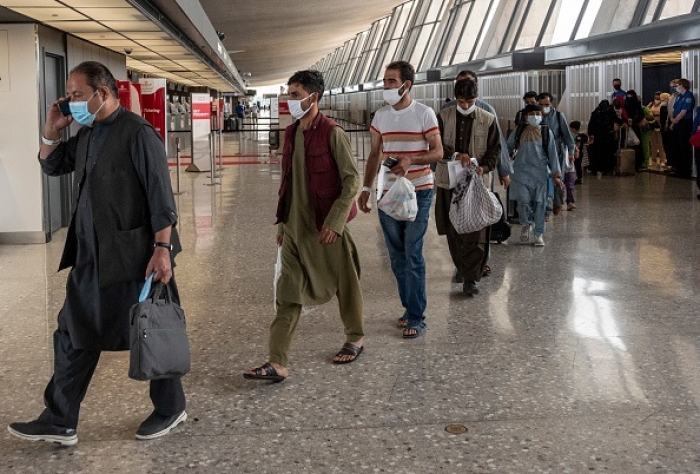DHS IG: Insufficient Vetting Means Some Afghans Resettled in U.S. May 'Pose a Risk to National Security'

(CNSNews.com) - Many of the 79,000-plus Afghan evacuees paroled into the United States after the disastrous U.S. withdrawal from Afghanistan were not properly vetted, says a new report from the Homeland Security Department's Office of Inspector General.
"We conducted this audit to determine the extent to which DHS screened, vetted, and inspected evacuees arriving as part of Operation Allies Refuge (OAR) and Operation Allies Welcome (OAW)," the inspector general said.
"After meeting with more than 130 individuals from the Department of Homeland Security, we determined DHS encountered obstacles to screen, vet, and inspect all Afghan evacuees...Specifically, U.S. Customs and Border Protection did not always have critical data to properly screen, vet, or inspect the evacuees."
For example, the report says, “417 records had first name unknown or “FNU.” 242 records had last name unknown or “LNU.” And 11,110 records had the DOB recorded as “January 1.”
The report said because of such inaccurate, incomplete or missing identification data, "DHS may have admitted or paroled individuals into the United States who pose a risk to national security and the safety of local communities."
In fact, citing "internal DHS reports," the IG said Customs and Border Protection officials "admitted or paroled dozens of evacuees with derogatory information into the country. The report gives two examples (see below).
'We all knew this was going to be a problem'
Sen. Rob Portman (R-Ohio) told Fox News on Wednesday, the OIG's conclusions are no surprise:
"In terms of the Afghan refugees, all of us want to take care of the Afghans who helped Americans, who stood shoulder to shoulder with us, interpreters and so on. But remember that chaotic withdrawal. A lot of people got on those airplanes who had nothing to do with the U.S. presence (there).
"And we brought them to the United States without properly vetting them. And that's what the inspector general has now said. It was pretty obvious. We all knew this was going to be a problem. We don't know how many Afghans are in this country who pose a national security threat.
"But we know that there are a few dozen, based on what the FBI has told us. And we just hope that they're being monitored -- we don't have an issue with that. So that's why the I.G. report today was so important, and really will be surprising to a lot of people who haven't followed this."
Sen. Amy Klobuchar (D-Minn.), who appeared on Fox News alongside Portman, noted that she and Sen. Lindsey Graham (R-S.C.) "just introduced a bill on vetting the Afghan refugees, but also for so many of them that helped our military, worked with the CIA, to make sure that we -- that they're no longer in limbo."
Klobuchar said getting out of "limbo" means giving them a green card.
"So, they need to be vetted," she said. "And I know we agree on that, but that, at some point, they're in a more stable situation, because they helped our American military, and they can't go back to Afghanistan right now."
As the IG report documents, at least two potential trouble-makers were admitted into the United States:
CBP paroled one evacuee into the United States who had been liberated from prison in Afghanistan by the Taliban in August 2021. The individual cleared lily pad screening and vetting processes and flew to the United States. At the U.S. POE, CBP officers identified derogatory information during the primary inspection. However, a supervisor “unreferred” the individual and paroled the individual into the country without a secondary inspection. Although the supervisor acted within policy, we could not determine whether the supervisor was aware of the evacuee’s prior incarceration. Approximately 3 weeks after this evacuee’s parole, the FBI obtained derogatory information. Subsequently, ICE removed this individual from the United States.
CBP paroled another evacuee into the United States who posed national security concerns. The evacuee initially cleared vetting at the lily pad and 3 months after being paroled into the United States, CBP obtained derogatory information from the FBI. According to ICE, at the time of our audit, the individual was undergoing removal proceedings.
The DHS IG made two recommendations, but DHS did not concur with either one.
Recommendation 1: DHS should "immediately identify evacuees from Afghanistan who are in the United States and provide evidence of full screening and vetting based on confirmed identification – especially for those who did not have documentation...(and) "Ensure recurrent vetting processes established for all paroled evacuees are carried out for the duration of their parole period."
Recommendation 2: "We recommend the Secretary of Homeland Security develop a comprehensive contingency plan to support similar emergency situations in the future and account for, screen, vet, and inspect all individuals during unprecedented events when limited biographic data is available."
No comments:
Post a Comment